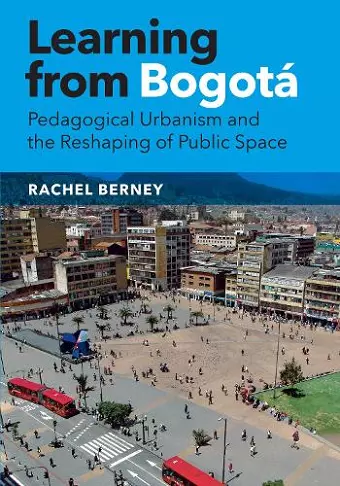Learning from Bogotá
Pedagogical Urbanism and the Reshaping of Public Space
Format:Hardback
Publisher:University of Texas Press
Published:17th Jan '17
Currently unavailable, and unfortunately no date known when it will be back

"A thorough and in-depth investigation of Bogota's much-praised urban transformation throughout the last twenty-five years. By recounting the successes and challenges of two key mayoral administrations in Bogota-Antanas Mockus and Enrique Penalosa-Berney makes a profound argument about the power of investment in public space and its significant transformative potential in the contemporary city." -- Felipe Correa, Harvard University, author of Beyond the City: Resource Extraction Urbanism in South America "Criticism such as Berney's is fundamental to understanding the need for deeper, more profound, and more sustained solutions to socioeconomic urban problems that have such long histories." -- Felipe Hernandez, King's College Cambridge, architect and author of Beyond Modernist Masters: Contemporary Architecture in Latin America
Learning from Bogotá illuminates how a former “drug capital” has been transformed into a “pedagogical city,” where redesigned public spaces teach residents how to reconnect with one another and become more engaged citizens
Once known as a “drug capital” and associated with kidnappings, violence, and excess, Bogotá, Colombia, has undergone a transformation that some have termed “the miracle of Bogotá.” Beginning in the late 1980s, the city emerged from a long period of political and social instability to become an unexpected model of urban development through the redesign and revitalization of the public realm—parks, transportation, and derelict spaces—under the leadership of two “public space mayors,” Antanas Mockus and Enrique Peñalosa (the latter reelected in 2015). In Learning from Bogotá, Rachel Berney analyzes how these mayors worked to reconfigure the troubled city into a pedagogical one whose public spaces and urban policy have helped shape a more tolerant and aware citizenry.
Berney examines the contributions of Mockus and Peñalosa through the lenses of both spatial/urban design and the city’s history. She shows how, through the careful intertwining of new public space and transportation projects, the reclamation of privatized public space, and the refurbishment of dilapidated open spaces, the mayors enacted an ambitious urban vision for Bogotá without resorting to the failed method of the top-down city master plan. Illuminating the complex interplay between formal politics, urban planning, and improvised social strategies, as well as the negative consequences that accompanied Bogotá’s metamorphosis, Learning from Bogotá offers significant lessons about the possibility for positive and lasting change in cities around the world.
[Learning from Bogotá] is clearly written and free of excessive academic posing…a worthy book insofar as it discusses several significant urban space projects in a city which was greatly improved in the late 1990s and early 2000s. * Journal of Latin American Studies *
Learning from Bogotá helps us understand the political nature and contradicaitons of Bogotá's urban planning process...the book delivers an assessment of how specific projects realize (or not) the larger political agenda conceptualized as pedagogical urbanism. * Journal of Latin American Geography *
[Learning from Bogotá] is well structured, graphically compelling, and important for considering whether framing urbanism as a platform for knowledge production permits more fundamental solutions than pure formalism, and if so, what civic infrastructure is required. * Latin American Research Review *
ISBN: 9781477311042
Dimensions: 254mm x 178mm x 23mm
Weight: 626g
190 pages